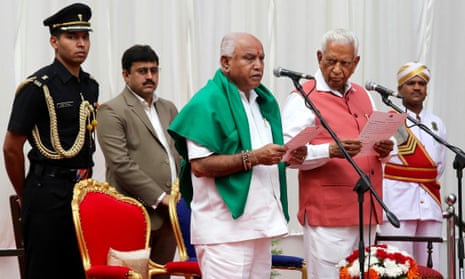The Eagleton Resort on the outskirts of Bangalore boasts tennis courts, five restaurants and luxury suites that overlook its world-class golf course. For two days this week, it was India’s nicest jail.
On Tuesday, results from a hard-fought election in south India’s Karnataka state were announced, showing neither prime minister Narendra Modi’s Bharatiya Janata Party (BJP), nor the incumbent Congress party, had won enough seats to govern outright.
The path to victory was clear: the BJP needed to persuade eight opposing members of parliament to defect or join its coalition.
In response, Congress and a smaller regional ally ordered at least 40 of their MPs onto buses, where they were shipped to the five-star Eagleton Resort and locked inside – beyond the reach of BJP negotiators.
Indians call it “resort politics”. Since the early 1980s, it has increasingly accompanied the horse trading that follows tight elections in the world’s largest democracy.
“You build a wall around your legislators so that the other party doesn’t encroach on them,” says BK Chandrashekhar, a Congress leader and former minister in several Karnataka state governments.
“It becomes a very dirty game of protecting people. Protecting them, but also making sure they don’t escape.”
The aftermath of Tuesday’s hung parliament has shown Indian politics at its rawest. Congress and its ally the Janata Dal (Secular) have accused BJP of offering bribes of up to 1-billion rupees (£10m) for defections. BJP denies the allegations.
At least two MPs were reported to have gone missing, sparking rumours they are ensconced in negotiations with the BJP and would emerge as members of the party’s coalition.
The tourism of board of neighbouring Kerala state tweeted a tongue-in-cheek invitation for Karnataka MPs to come unwind at its own “beautiful and safe” resorts.
On Thursday morning, the BJP was declared the provisional winner of the election, on the condition it can prove its majority in parliament. In one of his first acts, the new BJP leader BS Yeddyurappa stood down the police official who was overseeing the district that included the Eagleton Resort.
The police guarding the resort quickly vanished. Congress alleges BJP officials soon flooded the hotel trying to make contact with legislators. Dozens of MPs were again rushed onto buses, driven nine hours to Hyderabad city and quarantined inside a five-star hotel.
The spectacle is another reminder of the “purely selfish, Darwinian” nature of Indian politics, says Milan Vaishnav, the director of the south Asia program at the Carnegie Endowment for International Peace. “Think about the levels of insecurity party leaders need to have to do this,” he says.
“In a lot of other countries you would be able to rely on ideology or party loyalty. In India, ideology has been cast to the wind. It’s all about money, muscle, stature, proximity, family connections or your caste profile. Ideas are simply never part of the equation.”
Some members of Indian parliaments regularly switch parties at election time depending on the political winds. They, in turn, are more often selected by parties for their ability to muster voters or cash than their policy proposals.
“It is almost impossible these days in most Indian states affiliated with a major party unless you are a dynast, a celebrity with your own mass base or someone independently wealthy,” Vaishnav says.
Karnataka is a particularly egregious example of the trend: a decade ago about 63% of of MPs in the state were “crorepatis” – worth more than 1 crore, or £100,000. This year 97% of MPs boast that wealth, and half are worth ten times more.
So when elections are tight, instead of appealing to loyalty or ideology, party officials prefer to herd their MPs into resorts, where they wile days away at the buffet and pool.
“They do nothing,” says Chandrashekhar. “They eat well, they socialise, they have a nice time. It’s a prison without guards watching you, but your own party.”
The parties will find out on Saturday afternoon if their efforts have been successful. A roll call has been ordered in the Karnataka parliament to test the BJP’s numbers. Members will find out if they can return to their seats – or to the resorts.
